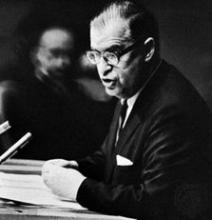It happens all too often that the ongoing debate about the Israeli-Palestinian conflict is reduced to broad terms. People take one side or the other, or more accurately they presume that the issue is so simple that there are only two sides to take. The constant, sensational news about the region and especially its violence distract people from the nuances of a very complicated story. Only through thorough study of the region's history, especially in the 20th century, can we be properly informed about how to pursue a lasting peace. The most important thing to remember is that history is made by people, by extraordinary individuals who devote their lives to great developments. In the story of Israel/Palestine, few individuals have been as important as Aubrey Solomon Meir Eban, also known as "Abba" Eban.
Born in South Africa and raised in England, Eban was a true practitioner of applied knowledge, a scholar who lived in the very marrow of human culture. By the time he took his first post in the newly-formed United Nations, he was fluent in several languages and highly experienced in the customs of many different societies. He had an impressive secular education going through Queen's College at Cambridge, graduating with high honors. In addition, Eban received a thorough Jewish education through his family, including learning Hebrew. His university studies focused on Oriental languages, which would include Semitic varieties such as Hebrew and Arabic. Eban was fluent enough in Arabic to translate whole novels. These linguistic skills would prove to be instrumental in his role as a lifelong diplomat.
Abba Eban was, like many politically active Jews of his time, a dedicated Zionist. As a student he was heavily involved with the Federation of Zionist Youth, an organization that promoted (and continues to promote) a multicultural approach to the region of Israel-Palestine. This would come to inform the policies Eban supported during the formation of the State of Israel in the late 1940's.
Abba Eban served as an intelligence officer for the British military in World War II. His main role was as an intermediary between Allied forces and the organization of Jewish settlers in the British Mandate of Palestine, known as The New Yishuv of Palestine. This diplomatic position brought Eban to New York City where he worked for the Information Department of the Jewish Agency. While there, he was one of the most vocal and important figures in the creation of UN Resolution 181, the plan to partition the British Mandate of Palestine into two sovereign nations, one a Jewish state and the other an equal Arab state, with the city of Jerusalem being declared an international territory controlled by the UN itself.
The Partition Plan was a highly contentious issue. Extremists on both the Jewish and Arab sides opposed the plan and made several attempts to circumvent it. Though the United Nations approved Resolution 181 and allowed the two emerging states to form governments, the peace was almost immediately violated when a combined military force from Egypt, Iraq, Lebanon and Syria invaded the newly-established Jewish state, thus beginning the Arab-Israeli War. The ensuing conflict lasted for a year with the occasional short-lived truce, finally ending with a decided victory for the Jewish state and a significant increase in its overall landmass. The region was simply not ready to accept a two-state solution to the problem.
After Israel won its independence, Abba Eban remained a liaison to the UN and also took up the post of Israel's ambassador to the United States. He was eventually elected Vice President of the UN General Assembly, holding that position for seven years. At the end of the 1950's, Eban took up residence in Israel and spent much of his life in various roles at the Knesset, Israel's parliament. While there he served as the Deputy Prime Minister under David Ben-Gurion, as well as the Minister of Education and Culture, and the Minister of Foreign Affairs. He later took the position of Minister Without Portfolio, which allowed him to cast a vote in the parliament without being affiliated with any particular party or coalition.
Abba Eban officially left public service in 1988, spending the remaining 14 years of his life dedicated to his writing, as well as taking guest lecturer positions at the Universities of Princeton, Columbia, and George Washington. Eban died in 2002 and was buried in Israel.
Abba Eban was a man who spent his life in the difficult world of international politics. Though he worked for reasonable, peaceful solutions, like so many others of his time he had to work against irrational, violent forces. Few individuals have done more for the fragile State of Israel or for Jewish culture around the world. He was a diplomat hero, a man of letters and a true inspiration.
